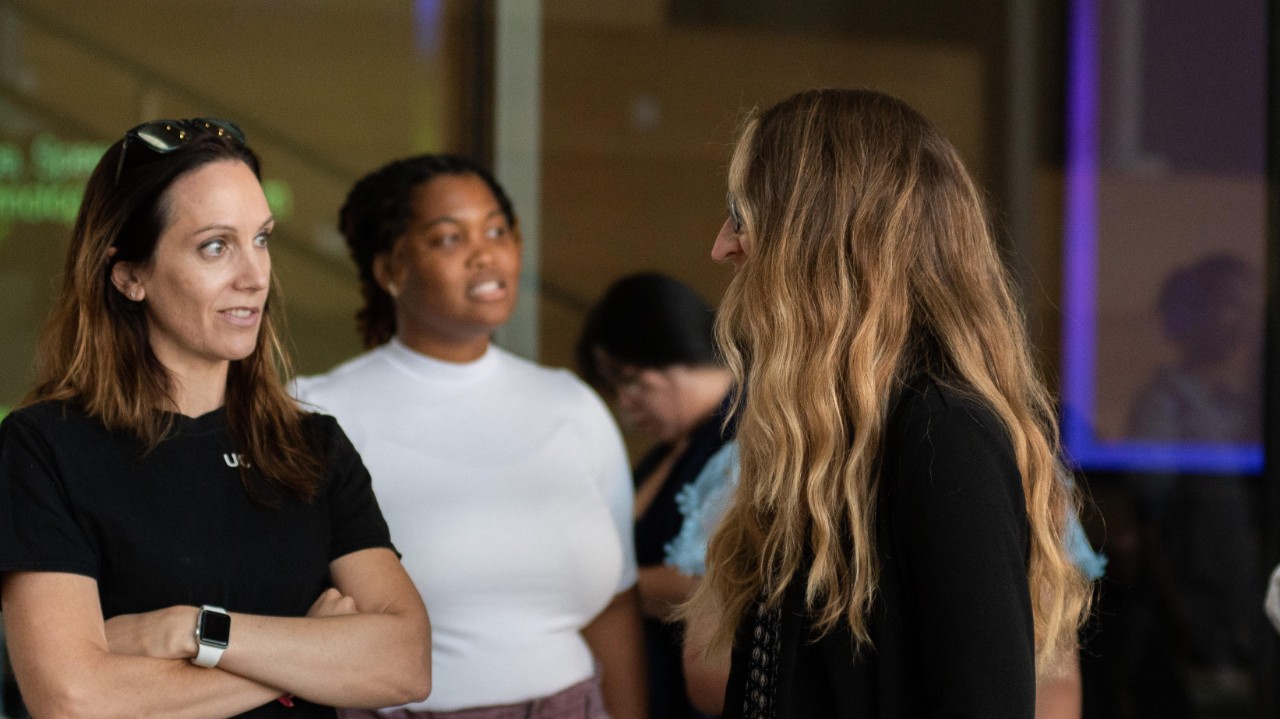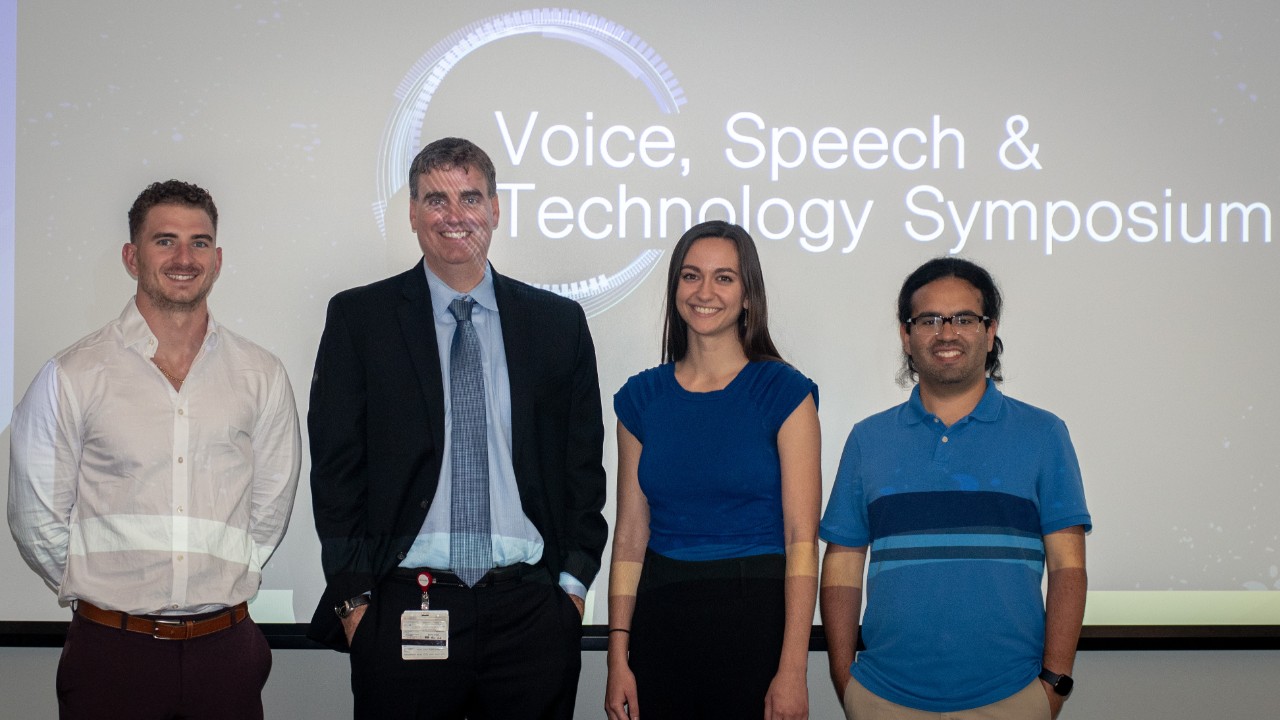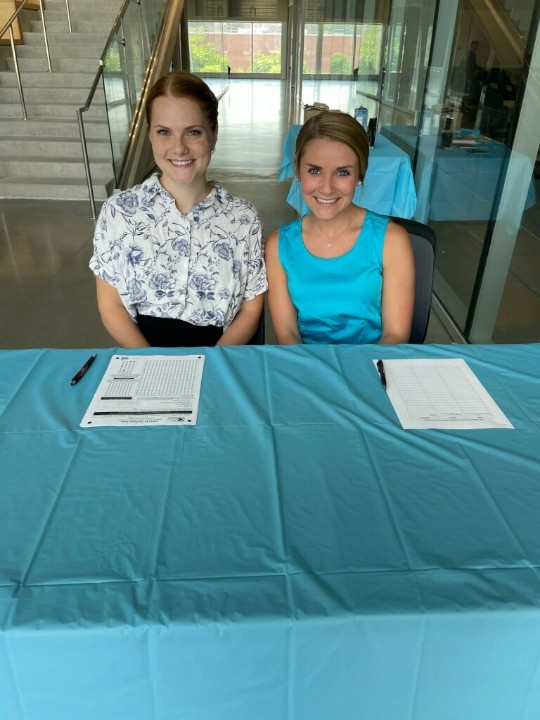
Fostering collaboration to improve patient care
CAHS co-hosts the first Voice, Speech, and Technology Symposium

As a researcher and professional in speech-language pathology, Victoria McKenna believes she has a responsibility to create space for local researchers, clinicians, and students to share their work, collaborate, and learn from each other. One way to do this is through providing accessible programming and events.
“We have an responsibility to create events that improve communication among researchers and clinicians so they can implement new ideas to help patients, which is ultimately our goal with everything we do,” says McKenna, PhD, CCC-SLP, who oversees the Voice & Swallow Mechanics Lab and serves as an assistant professor in the Department of Communication Sciences and Disorders and secondary faculty in the Department of Biomedical Engineering and the Department of Otolaryngology-Head and Neck Surgery at UC.
To establish a collaborative event that enables scientists in the Greater Cincinnati community to showcase and discuss innovative research projects in the speech and voice sciences, McKenna partnered with Rebecca Howell, MD, division director of laryngology at UC and director of the UC Health Voice and Swallowing Center, and Sid Khosla, MD, vice chair of research in UC’s Department of Otolaryngology-Head and Neck Surgery. On July 21, the trio sponsored the first Voice, Speech, and Technology Symposium (VSTS) at the College of Allied Health Sciences Building. Free to attend and open to the public, the event featured three presentations delivered by a mix of graduate students and researchers in biomedical engineering, speech-language pathology, and laryngology.

left to right: Jacob Michaud, BS, Greg Dion, MD, Jacqueline Meriwether, BS and Andres Llico, PhD
“Something that Rebecca, Sid, and I stressed was that we wanted it to be a supportive environment where people could talk about ongoing projects and then receive feedback or ideas to improve them,” McKenna says. “It didn’t have to be these completely polished projects. We wanted to create a working group where people can get feedback, talk to each other, and collaborate.”
Each presentation included time for questions from the 30-member audience, and a light reception afterward allowed for further discussion and networking. The final speaker, Greg Dion, MD, a laryngologist who joined the College of Medicine in June, shared his research on targeted therapeutic delivery to address laryngotracheal fibrosis using mucoadhesive patches. Dion says forums like VSTS are crucial for several reasons.
“Forums to present and discuss research are not only important for the advancement of medical technology and treatment, but also the opportunity to develop young investigators and foster collaboration across a multitude of colleges and departments,” Dion says.
Supporting young researchers and students interested in research was a priority for the event’s organizers. In fact, three UC students who study speech-language pathology and work in McKenna’s lab helped plan, promote, and oversee the event.
“VSTS brings together various research groups that provide valuable connections and open up opportunities for students to engage in research that will impact their field,” says Haley Doerr, who served on the student planning committee and will be a second-year graduate student studying speech-language pathology this fall.
As professionals, students will consistently be working across a multidisciplinary team, and this symposium was able to showcase a glimpse of that
Haley Doerr Second-year speech-language pathology student

Anna Birkemeier and Haley Doerr.
Doerr, along with fellow student planning committee members Anna Birkemeier and Savannah Shanley, plans on helping with the next VSTS installment, which is scheduled for December 15. Dion also plans on staying involved with the symposium series.
With the goal to host VSTS twice a year at UC, McKenna hopes to help grow the audience and event regionally and possibly add a virtual component to make engaging in VSTS more accessible for those who can’t attend in person. As a bonus, speech-language pathologists can earn continuing education credit for attending.
“We want to expand it to anywhere affiliated with UC, including Cincinnati Children’s Hospital Medical Center or the Veterans Affairs Cincinnati Healthcare System, and the Greater Cincinnati community,” McKenna says. “We hope to make VSTS regional hub for innovation in science. I think that’s a mission of our college and also a mission of the university.”
For more information about the upcoming Voice, Speech, and Technology Symposium scheduled for December 15, visit vsmechlab.com.
Related Stories
Leveling up
May 2, 2025
Meet four College of Allied Health Sciences students who are advancing their education following graduation this May.
Everything you need to know about scents and your hair
May 1, 2025
The University of Cincinnati's Kelly Dobos was featured in an NBC News article discussing the science behind hair fragrances and shampoos.
Machine learning brings new insights to cell’s role in...
April 30, 2025
Researchers led by the University of Cincinnati’s Anna Kruyer and the University of Houston’s Demetrio Labate have published research in the journal Science Advances applying object recognition technology to track changes in brain cell structure and provide new insights into how the brain responds to heroin use, withdrawal and relapse.